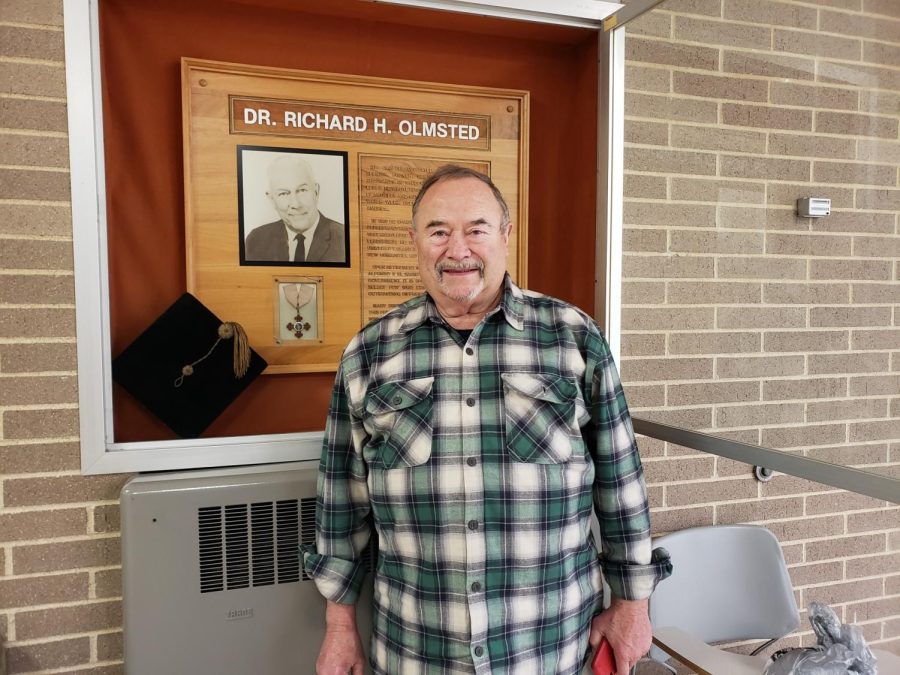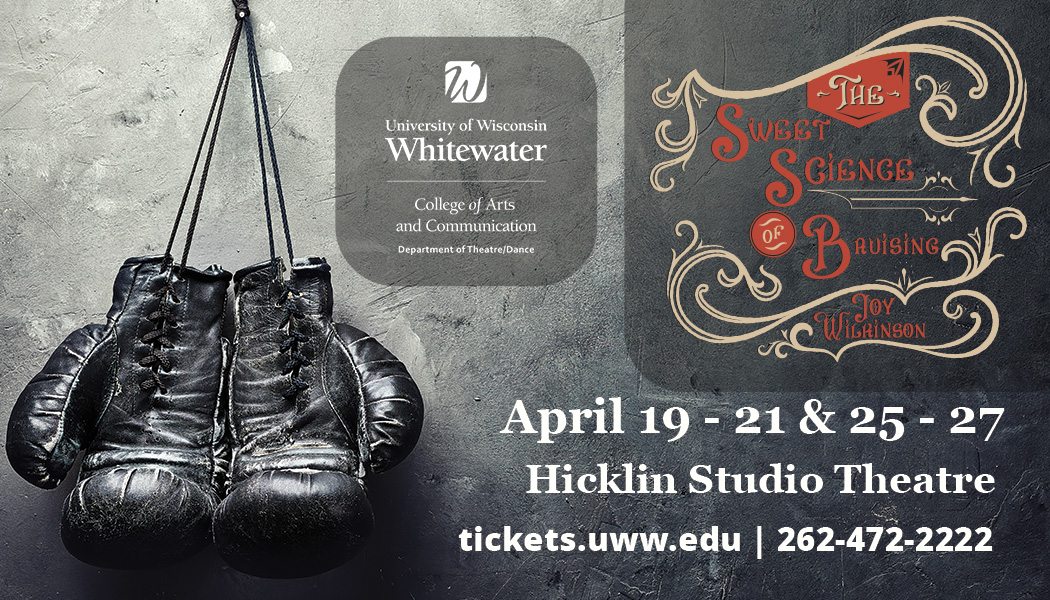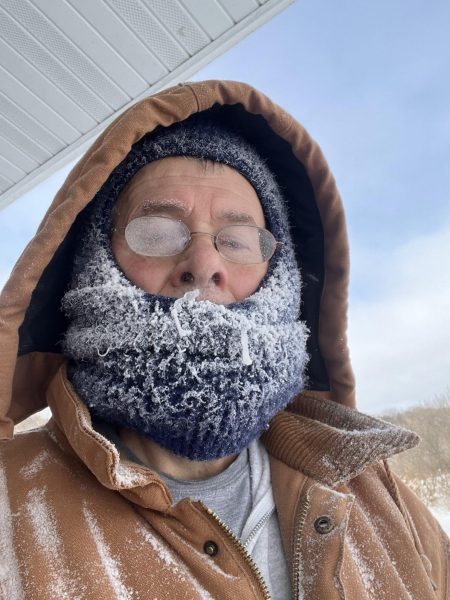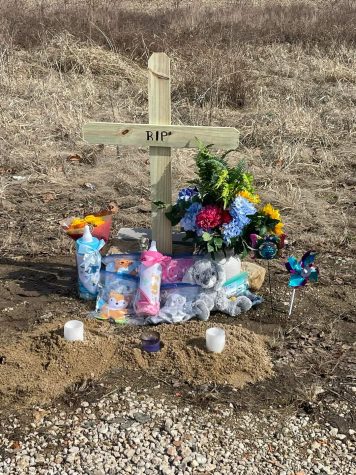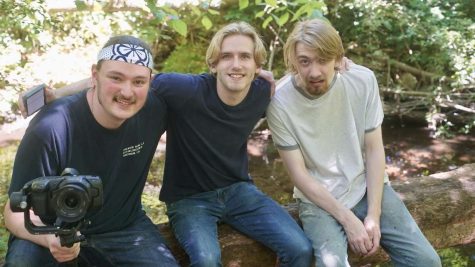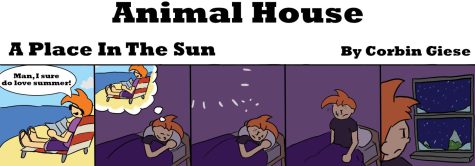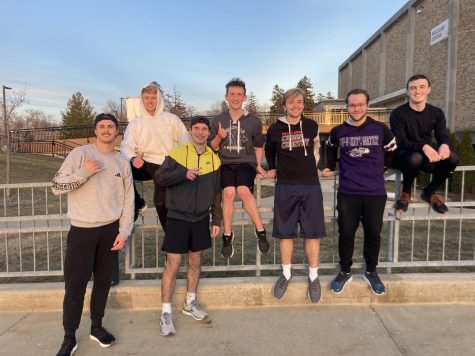Olmstead Hall: An unassuming connection
Jim Olmsted son of Dr. Richard Olmsted poses in front of a plaque in his father’s honor outside lecture hall 100 of Heide Hall.
January 30, 2023
It’s 7:56 am on a cold Monday morning, and though the sun has just begun to rise over the horizon, it hangs obscured from sight by a January snow flurry. UW-Whitewater students are steadily trudging into one of the largest lecture halls on campus for their first day of class of the Spring Semester. The mood in the lecture hall is one of sleepy disorientation. With well over 130 students enrolled in a core curriculum class, they struggle to find the few remaining open seats. While the location information for Comm 110, Introduction to Public Speaking, posted to the student’s web accounts, reads Heide rm. 100, there is a large, embossed, plaque above the double doors leading down into the lecture hall which reads – Olmsted Lecture Hall. Though thousands of students shuffle past the unassuming placard every day, few if any, consider the origins of the hall’s name sake, unaware of a legacy which embodies the core values and mission of UW-Whitewater and continues to resonate to this very day, if only silently.
Dr. Richard Olmsted, for whom Heide 100 was dedicated in 1989, served the University of Wisconsin – Whitewater as professor of Spanish and Chair of the Department of Foreign Languages from 1960 until his retirement in 1971. Dr. Olmsted’s son, Jim Olmsted, who currently resides with his wife Lisa Olmsted in Verona, WI, recalls his father as “unassuming… a common man, well liked, and deeply conscious of other people’s feelings”. While Dr. Olmsted appeared as a “common man” his remarkable life and accomplishments were anything but common. Born in Ithaca, New York, in 1900, he would serve in WWI, go on to complete a Masters and PhD (in only two years) from the University of Minnesota, and publish several textbooks during his decades long career as a professor at several universities around the country. He lived in Mexico for a period, played the violin, loved nature and even hand built one of his family’s homes in Kalamazoo, Michigan. Though unassuming, he was no doubt a brilliant man. A voracious reader and polyglot; he spoke Spanish, German, French, Italian, and English – many of which he taught at the university level throughout his long and decorated career.
On display outside of Olmsted Lecture Hall is the prestigious King Alfonso X El Sabio medallion, which Dr. Olmsted received from the Spanish Government for his “contributions to the diffusion of Spanish culture and values, through instruction in the Spanish language.” However, even given such a diverse, cultured, and accomplished life, Jim Olmsted, reflecting on his father’s legacy, maintained, “In summary, and most importantly, [Dr. Richard Olmsted] was an educator. Empathetic to the students and invested in their success, he formed deep connections with them [students], as well as with the entire Whitewater community.” Indicative of the bond Dr. Richard Olmsted built with his students, were the numerous Christmas cards he would continue to receive from former students for decades after they had graduated. In recounting numerous stories from the life of his father, Jim Olmsted, also revealed the character of a man, who was not only a dedicated educator, but father and husband as well.
“When I was younger, and our family was still living in Kalamazoo, Michigan, [Dr. Richard Olmsted] would drive from Stephen’s College, in Colombia, Missouri, where he taught at the time, some 600 miles every weekend to be with us…when [Dr. Richard Olmsted], got a job at UW-Whitewater and moved the family there, he made sure to schedule his classes in such a way that he made every one of my high school and college football games.”
For many of the current UW-Whitewater students and even faculty, the remarkable and inspiring life of Dr. Richard Olmsted, obscured by time, remains hidden in an unassuming placard in Heide Hall. Several graduate student instructors, who teach in Olmsted Lecture Hall, sheepishly admitted, though they had heard the name, were unaware that it was in fact the name’s sake of the lecture hall in which they taught. Dr. Tammy French, teaches Comm 110 to all those sleepy eyed students in Olmsted Lecture Hall three days a week at 8 am. She has walked past the hall everyday since she started with the university in 2006. However, she too regretfully admitted knowing little about his life and contributions beyond what is stated on the placard near the lecture hall.
However, she lamented the march of time’s inevitable erosion on the personal connections of future students and faculty to rooms, lecture halls, and buildings which are named in honor of those who have served the university in the past.
“This really hits home for me…in the Communication Department, Professor Bill Lowell, recently retired. He had been here for 26 years, he was an amazing professor, did a lot for the department, and to commemorate his retirement we named a room on the fourth floor of Heide after him. When I walk past it, I smile, because I knew Bill, and some students still know who Bill was…but, it will be sad to me, when those of us who worked with Bill retire, and certainly students graduate… it won’t take long for people to no longer know who he was.”
Though time may erode the personal connections current and future students and faculty have with those honored here on campus, it in no way diminishes the contributions and impact they had on all those who came through UW-Whitewater and the community at large. In fact, their legacy continues to live on in UW-Whitewater’s mission, vision, and values. Each of those honored here on campus, undoubtedly, contributed to the University and its culture as it stands here today, ensuring the further continuation of those values which make UW-Whitewater a special place.
Indeed, Dr. Richard Olmsted, helped create, added to, and carried on many of the values which adorn the UW-W mission’s webpage today. One of which is the importance of a well-rounded liberal arts education. Dr. Olmsted was instrumental in the creation of a foreign language’s requirement here on campus. Furthermore, the “focus on transforming lives…preparing students to become lifelong learners…and investment in meaningful relationships that leverage our respective talents and strengthen the Warhawk family.”, are all embodied by the educator and man that Dr. Richard Olmsted was and continue to support the culture and mission of UW-Whitewater into the future regardless of the existence of a personal connection.

